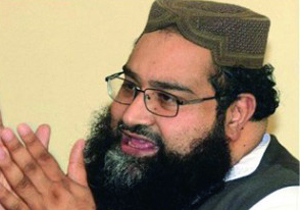
|
| Tahir Ashrafi, the head of the Pakistan Ulema Council. Image from TOLOnews. |
The tortuous path of the Afghan government's plan for a regional ulema conference that would issue a fatwa condemning suicide attacks reached a new impasse yesterday when the head of Pakistan's ulema council stated that suicide attacks are permissible. The proposed conference, originally put forward by Afghanistan's High Peace Council, was agreed to by Pakistan in November, and then hit a series of snags as it was condemned by the Taliban in late December and early January.
The conference, which had been scheduled for January, was postponed; its agenda grew murky, the venue changed from Kabul to various other locations, and its fate became uncertain. It has been termed variously a "peace conference" and a conference on the issue of suicide bombings.
In an interesting twist, last month the Taliban changed their stance from condemning the proposed conference to demanding to take part in it. Reports suggested that Pakistan's position on the proposed conference mirrored that of the Taliban, which remained steadfastly opposed to a gathering that would potentially outlaw the tactic of suicide bombing. [See LWJ report, Karzai presses for fatwa on suicide attacks.]
Afghan officials have resisted the Taliban's demand to be included in the conference, suspecting no doubt that the Taliban would subvert the original goal of obtaining a fatwa against suicide bombings, and the event has appeared to be destined for limbo. Meetings between Afghan and Pakistani religious scholars on the proposed conference have reflected division between the two groups, and as of a few weeks ago they had apparently agreed only to hold a joint conference in March on the issue of attacks on civilians, according to Xinhua.
The picture became much clearer yesterday, however, when the head of Pakistan's ulema council announced that suicide attacks are permitted in Afghanistan so long as US forces remain in the country.
"Palestine is occupied by Israel, Kashmir by India, and Afghanistan by the US. So if the Muslims don't have the atomic bomb, they should sacrifice their lives for God," Tahir Ashrafi, the head of the Pakistan Ulema Council, told TOLOnews.
Significantly, Ashrafi's rhetoric on suicide attacks is identical to that of the Movement of the Taliban in Pakistan. In January 2009, the Movement of the Taliban in Pakistan released a propaganda tape in which a jihadist said that "suicide bombers are the atomic weapons of Muslims."
In the tape, a teenage suicide bomber named Masood, who was involved with a May 2008 double suicide bombing in Lahore, stated: "Suicide bombers are the atomic weapons of Muslims because Muslims do not have the latest weapons to fight enemies who are committing atrocities against Muslims in Kashmir, Palestine, Afghanistan and Iraq."
The Taliban's influence is evident in the Pakistani clerics' recent letter to the Afghan ulema council, in which the Pakistani council stated that it would not attend the planned joint ulema summit, saying it was unwilling to criticize the Afghan Taliban's activities or issue a fatwa against them or their activities, Khaama Press reported.
In another interesting twist, Ahmad Saeedi, an Afghan political commentator, has claimed that the latest statement on suicide bombings by the head of the Pakistani ulema was issued at the request of Pakistan's Inter-Service Intelligence Directorate, according to Pajwhok Afghan News.
Afghanistan's ulema council has rejected the position of its Pakistani counterpart, and maintains that suicide attacks are not permitted by Islam.
It is not surprising that the Taliban continue to sabotage any attempt to curtail the use of suicide attacks, which constitute one of the most powerful weapons in their arsenal. As data compiled by the South Asia Intelligence Review of the South Asia Terrorism Portal show, the number of suicide attacks in Afghanistan rose from one in 2001 (the bombing that killed Northern Alliance leader Ahmad Shah Massoud on Sept. 9, 2001, two days before 9/11) to 736 by Sept. 5, 2011 (the date of the SAIR report), with a total of 3,755 fatalities.
Yesterday's statement by the head of the Pakistani ulema approving the use of suicide attacks in occupied Muslim lands also correlates with the increasing use of suicide attacks by the Taliban's close ally, al Qaeda, and its affiliates in jihadist theaters worldwide.